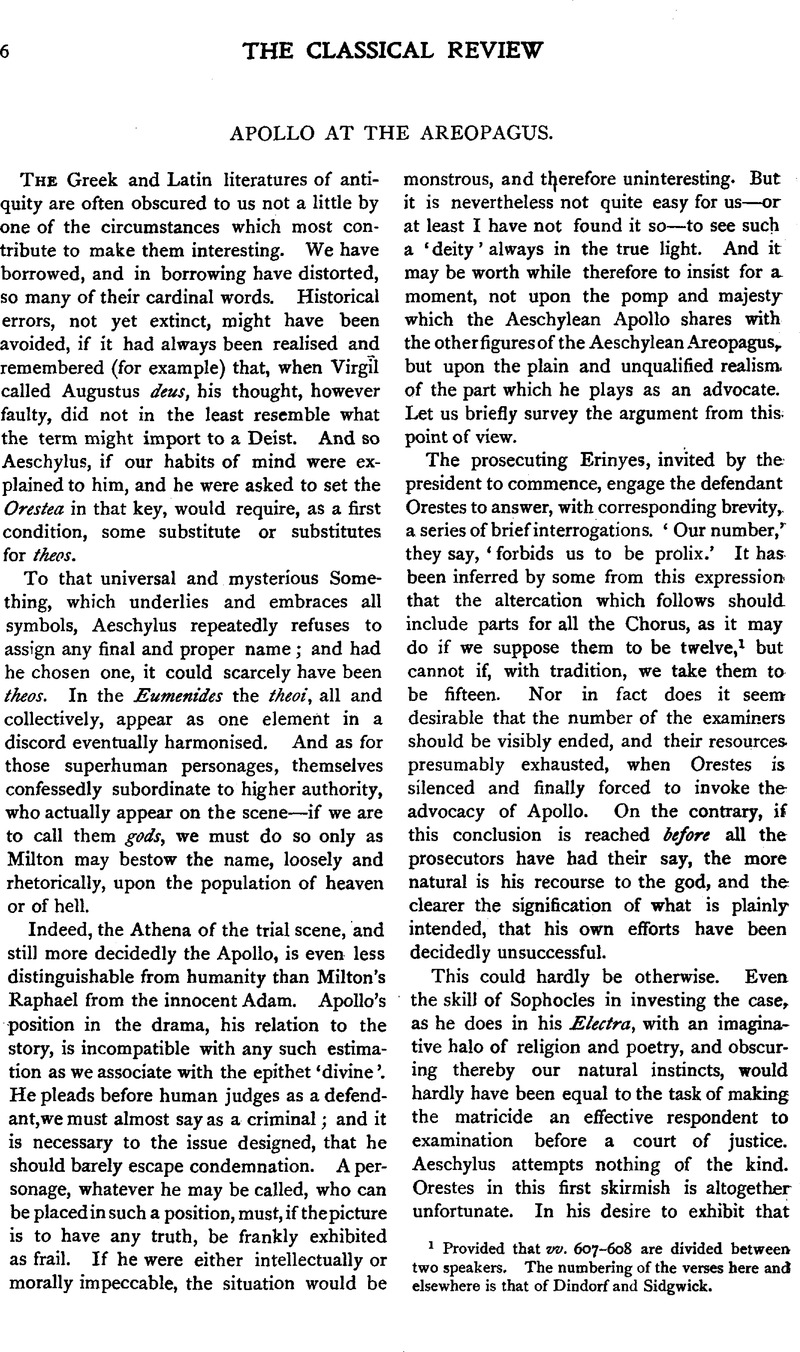No CrossRef data available.
Article contents
Apollo at the Areopagus
Published online by Cambridge University Press: 27 October 2009
Abstract

- Type
- Original Contributions
- Information
- Copyright
- Copyright © The Classical Association 1907
References
page 6 note 1 Provided that vv. 607–608 are divided between two speakers. The numbering of the verses here and elsewhere is that of Dindorf and Sidgwick.
page 7 note 1 592 ![]() , to be punctuated so, as grammar requires. The abruptness of form is intentional, and worthy of the sense. In v. 593 the examiner explains the question as intended.
, to be punctuated so, as grammar requires. The abruptness of form is intentional, and worthy of the sense. In v. 593 the examiner explains the question as intended.
page 7 note 2 Il. 15. 41.
page 7 note 3 Jane Austen, Emma, chap. 26.
page 7 note 4 Note the change of tense in vv. 587–588 κατ⋯κ τ∘νας—ἔκτεινα.
page 7 note 5 v. 1498.
page 7 note 6 ib. 1505.
page 8 note 1 599–03:
XO. 
With Svoiv supply νεκρ∘ῖ from νεκρ∘ῖσι In the last verse, ![]() expresses a proposition which we should make subordinate, though the Greek, as often, puts it as parallel with the inference from it. The argument, stated with a brevity which, like some other parts of this scene, suggests that in substance it was already familiar to the audience, is made unintelligible in modern texts by the change of μιασμ⋯των to μιασμ⋯τ∘ιν (Elmsley) and φ⋯ν∘υ to φ⋯νῳ (Schuetz). The attempts to explain the text so corrected take no account of τ∘ιγ⋯ρ (therefore), as some have noticed, and are open to other objections, besides the general objection that they leave the whole without point. In υ. 600 the metaphor ἔχειν πρ∘σβ∘λ⋯ς τινι (to be open to the attack of) is military ; see πρ∘σβ∘λ⋯. The case of δν∘ῖν is dative. The genitive νιασν⋯των defines the nature of the πρ∘σβ∘λα⋯ or ‘assailable points.’
expresses a proposition which we should make subordinate, though the Greek, as often, puts it as parallel with the inference from it. The argument, stated with a brevity which, like some other parts of this scene, suggests that in substance it was already familiar to the audience, is made unintelligible in modern texts by the change of μιασμ⋯των to μιασμ⋯τ∘ιν (Elmsley) and φ⋯ν∘υ to φ⋯νῳ (Schuetz). The attempts to explain the text so corrected take no account of τ∘ιγ⋯ρ (therefore), as some have noticed, and are open to other objections, besides the general objection that they leave the whole without point. In υ. 600 the metaphor ἔχειν πρ∘σβ∘λ⋯ς τινι (to be open to the attack of) is military ; see πρ∘σβ∘λ⋯. The case of δν∘ῖν is dative. The genitive νιασν⋯των defines the nature of the πρ∘σβ∘λα⋯ or ‘assailable points.’
page 9 note 1 By taking the life of Aegisthus. The aorist (![]() v. 624) is right, notwithstanding proposed corrections.
v. 624) is right, notwithstanding proposed corrections.
page 9 note 2 Note λεώς in v. 638.
page 9 note 3 ὑμώς, with emphasis, v. 643.
page 10 note 1 ![]() , 657.
, 657.
page 10 note 2 614, 643, etc.
page 10 note 3 μ⋯θε 657, σοι 662.
page 10 note 4 Under date 1776. Vol. iii. p. 279 of the Temple Classics edition.
page 10 note 5 658–661.
page 10 note 6 vii. 10. This reference, we may remark, involves a further ignoratio elenchi, and indeed the reasonings of Boswell are commonly composed of such.
page 11 note 1 662–666.
page 11 note 2 667–673.
page 11 note 3 674–675.




